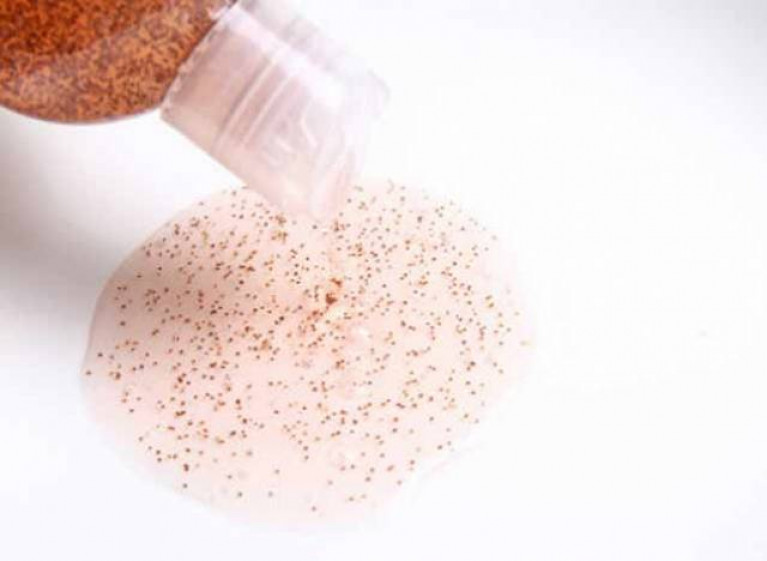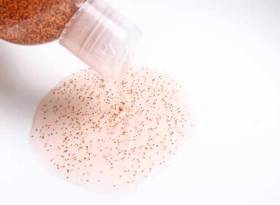Displaying items by tag: microbeads
New Laws to Reduce Microplastic Pollution Come into Effect
Legislation aimed at reducing microplastic pollution in marine and fresh waters has been enacted by the Government, four months after the EU gave clearance for the move writes Lorna Siggins
The Microbeads (Prohibition) Act 2019 (Commencement) Order 2020 was signed into law earlier this month by Minister for Planning and Local Government Eoghan Murphy and came into effect yesterday.
As Afloat reported last October, a small number of EU member states have introduced similar measures in relation to cosmetics and personal care products, Ireland has “gone further” and “extended these prohibitions to household and Industrial cleaning products”, Mr Murphy’s department says.
The Act prohibits “the manufacture or placing on the market of cosmetics and personal care products that may be washed or rinsed off with water, as well as household and industrial cleaning products, and that contain plastic microbeads”.
“Placing on the market is defined as “to sell; offer or expose for sale; advertise or invite an offer to purchase; distribute free of charge; import or export; or supply for any of those purposes (whether or not for profit)”.
The Act also makes it an offence to dispose of any substance containing microbeads by pouring it down the drain or into marine or freshwater environments.
The aim is to protect marine wildlife and the environment.
The Environmental Protection Agency has been assigned responsibility for implementing the legislation, with support from Customs officials and the Gardaí.
A person summarily convicted under the legislation could receive a Class A fine and//or a prison sentence of up to six months.
Conviction on indictment may mean a fine of up to €3,000,000 and/ or a prison sentence of up to five years.
The department said that Ireland would “continue to work” with the European Commission and other EU member states to develop “further robust regulatory measures to address microplastic pollution”.
EU Clears Way for Laws Restricting Microbead Use
The EU has permitted the Irish government to introduce legislation restricting use of plastic microbeads to protect marine wildlife and the environment writes Lorna Siggins.
Minister for Housing, Planning and Local Government Eoghan Murphy confirmed the European Commission’s clearance last night (Wed), and said he hoped the new legislation would be in place as soon as possible.
“While several states legislated to prohibit personal care products containing plastic microbeads Ireland will be the first EU member state to extend such prohibition to detergents, abrasive scouring agents and other cleaning products," he said.
Mr Murphy also announced initiation of an expert group to advise on expanding Ireland’s marine protected areas (MPAs).
He was speaking at An Taisce’s annual Clean Coasts “Love Your Coast” photography awards in The Morrison Hotel, Dublin.
Mr Murphy acknowledged that plastic microbeads “represent only one element of the microplastics in our oceans”.
“However, it is estimated that many billions are being washed down the drain and into the world’s rivers, lakes and seas each year. Once in our rivers and seas, they can last for centuries without breaking down. Aquatic animals may ingest them and they cannot be removed once they are in the marine environment,”he said.
The Microbeads (Prohibition) Bill 2019, which is at committee stage in the Dáil, required EU approval, due to its proposed restriction on the free movement of goods in the European single market.
The legislation will provide for a prohibition of the “manufacture, import, export or sale of products containing intentionally added plastic microbeads, to include “rinse-off” personal care products, detergents, and domestic and industrial abrasive cleaning products and scouring agents”.
Mr Murphy submitted a derogation notification for the Bill to the European Commission on 19th July 2019, along with detailed technical documentation supporting the justification for the restriction on environmental grounds.
The notification carried with it a three month standstill period during which time the legislation could not be enacted in compliance with EU legislation, and that standstill period concluded on October 21st.
The legislation provides that the Environmental Protection Agency is responsible for implementation, Mr Murphy said.
It proposes that a person convicted would receive a Class A fine and/or a prison sentence of up to six months on summary conviction, or a fine of up to €3,000,000 and or a prison sentence of up to five years on indictment.
“While this is an important step, it is only one of many measures we will have to introduce over the coming years to reduce the level of litter and plastic pollution entering our seas and oceans,” Mr Murphy said.
In addition to introducing national legislation, the Government has been “actively supporting the development of measures at EU-level to tackle plastic waste including through the European Strategy for Plastics in a Circular Economy adopted in January 2018”, he said.
Mr Murphy also said he intended to bring forward primary legislation to designate marine protected areas (MPAs) next year, and plans to “significantly expand” Ireland’s network of such protected zones to meet current internationally agreed target of ten per cent.
He said it was central to Ireland’s implementation of the EU Marine Strategy Framework Directive, the OSPAR Convention, and commitments under the UN Sustainable Development Goals and the UN Convention on Biological Diversity”.
He said that he had invited Professor Tasman Crowe, director of the Earth Institute and associate dean of science at University College, Dublin to chair an expert advisory group.
“The other members of the advisory group will be selected from across a range of sectors and will consist of members with appropriate national and international expertise,” Mr Murphy said, and its composition would be “announced shortly”.
“Their work will include reviewing existing protection measures and advising me on the processes required for the creation of MPAs,” Mr Murphy said.
The group “will also consider the gaps in existing legislation to underpin such a network” he said, and he expected the work would take place over a period of six months. The report with recommendations would “feed into the development of this important new legislation”, he said.
MPAs can take a variety of forms ranging from exclusive marine reserves to areas allowing sustainable use and restricting specific activities, Mr Murphy’s department said.
“Ireland's future network may include the incorporation of existing marine Special Protection Areas (SPAs) and Special Areas of Conservation (SACs) under the Birds or Habitats Directives. It may also incorporate protection measures established under the Common Fisheries Programme (CFP) and other conservation and protection measures,”it said.
“MPAs can also play a role in mitigating the effects of climate change and ocean acidification by ensuring that the marine ecosystems are healthy and resilient and by safeguarding the marine environment’s current role as a natural storage of carbon,” it said.
Ireland, through the EU, is a party to the UN Convention on Biological Diversity (CBD).
It has agreed that “by 2020, at least 17 per cent of terrestrial and inland water areas and 10 per cent of coastal and marine areas, especially areas of particular importance for biodiversity and ecosystem services, are conserved through effectively and equitably managed, ecologically representative and well-connected systems of protected areas and other effective area-based conservation measures, and integrated into the wider landscape and seascape”.





























































